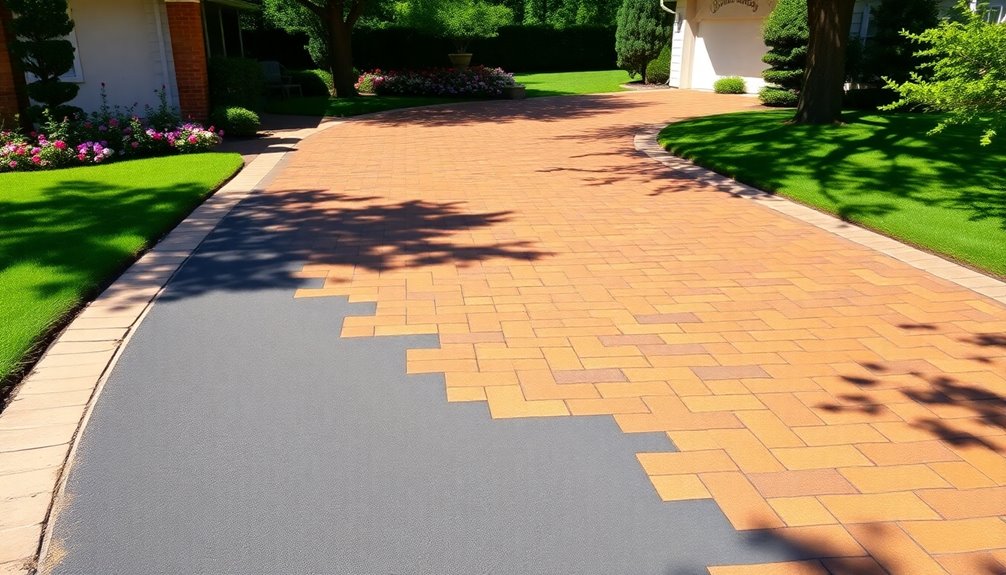When choosing the best material for your driveway, consider asphalt and concrete for durability and curb appeal. Asphalt's cost-effective nature and flexibility make it a popular option, lasting 15-20 years, while also providing a smooth finish. Concrete offers high strength and can last up to 30 years with proper maintenance, plus it's available in various aesthetic designs. If you prefer a classic look, brick pavers enhance property value and require minimal upkeep. Each option has its benefits, so you'll want to assess your priorities before deciding. There's more information ahead that can help you choose the perfect driveway material.
Key Takeaways
- Concrete offers durability and longevity, lasting up to 30 years with low maintenance, making it a solid investment for driveways.
- Asphalt is cost-effective and flexible, lasting 20-30 years while providing a smooth finish that enhances curb appeal.
- Brick pavers deliver a classic aesthetic with exceptional durability and minimal maintenance, significantly boosting property value.
- Gravel is budget-friendly with excellent drainage, but may require frequent replenishment and can be less stable in wet conditions.
- Choose materials based on climate, maintenance needs, and appearance to ensure the best long-term investment and curb appeal for your driveway.
Overview of Driveway Materials
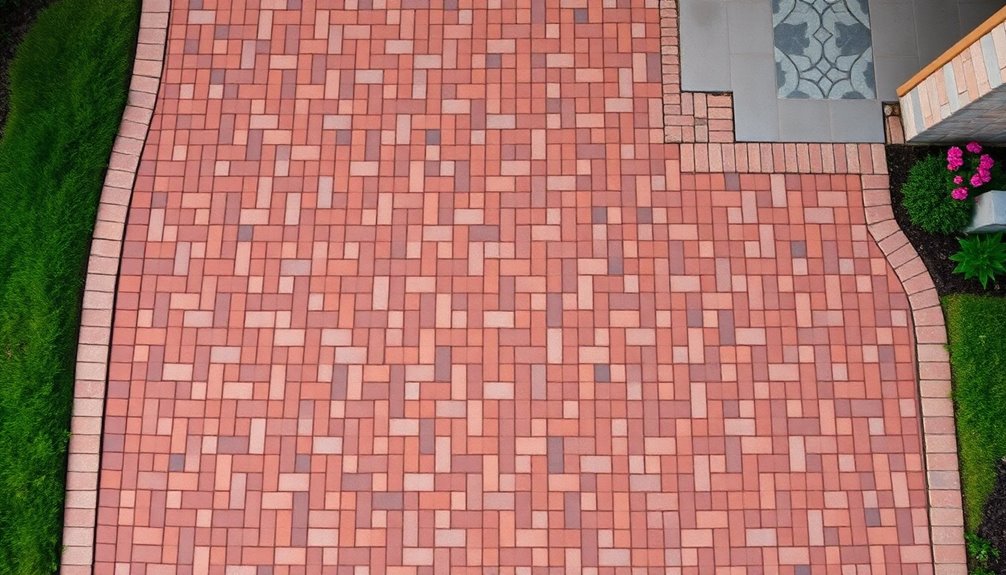
When you're considering the best material for your driveway, it's essential to understand the various options available.
Concrete driveways are durable, lasting up to 30 years with proper maintenance, but they tend to be pricier than asphalt.
Asphalt driveways last 15 to 20 years and are generally more affordable than concrete, making them a popular choice.
If you prefer a classic look, brick driveways can last up to 50 years but come at a higher cost.
Lastly, gravel driveways are the most budget-friendly option, lasting around 10 to 15 years, though they require more upkeep.
Each material has its unique characteristics, so weigh your options based on durability, cost, appearance, and maintenance needs.
Advantages of Asphalt
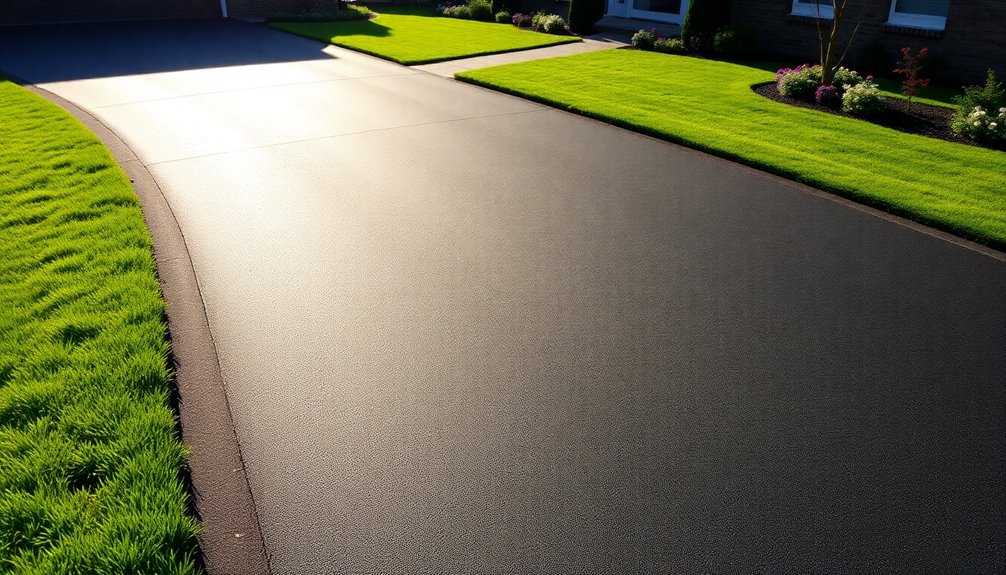
Asphalt driveways stand out for several compelling reasons that make them a popular choice among homeowners.
First off, they're cost-effective, with lower initial installation costs and easy maintenance that typically runs between $300 to $1,000 annually. You'll appreciate how quickly asphalt can be laid down—often in just a few days.
Durability is another plus; asphalt can last 20 to 30 years with proper care and withstand heavy traffic. Its flexibility helps prevent cracking, while its smooth finish enhances your home's curb appeal.
Asphalt is also environmentally friendly, as it's recyclable and produced with a low carbon footprint. Overall, its practicality and adaptability to various climates make asphalt a smart, stylish choice for your driveway.
Benefits of Concrete

Although many homeowners opt for asphalt, concrete driveways offer a range of benefits that make them an attractive alternative.
First, their high strength ensures they can handle heavy loads and traffic, lasting 20 to 30 years with proper maintenance. Concrete's durability in various weather conditions means you won't deal with frequent repairs, and it's resistant to pests like termites.
Aesthetically, concrete can be customized with stains, colors, and stamped patterns, allowing you to match your home's style. While the initial cost may be higher, its long lifespan and low maintenance make it cost-effective over time.
Plus, concrete's sustainability and recyclability contribute to a lower environmental impact, making it a smart choice for your driveway. Additionally, concrete can be a stable income option for homeowners considering renovations in the future, ensuring their investment holds value over time.
Pros and Cons of Gravel
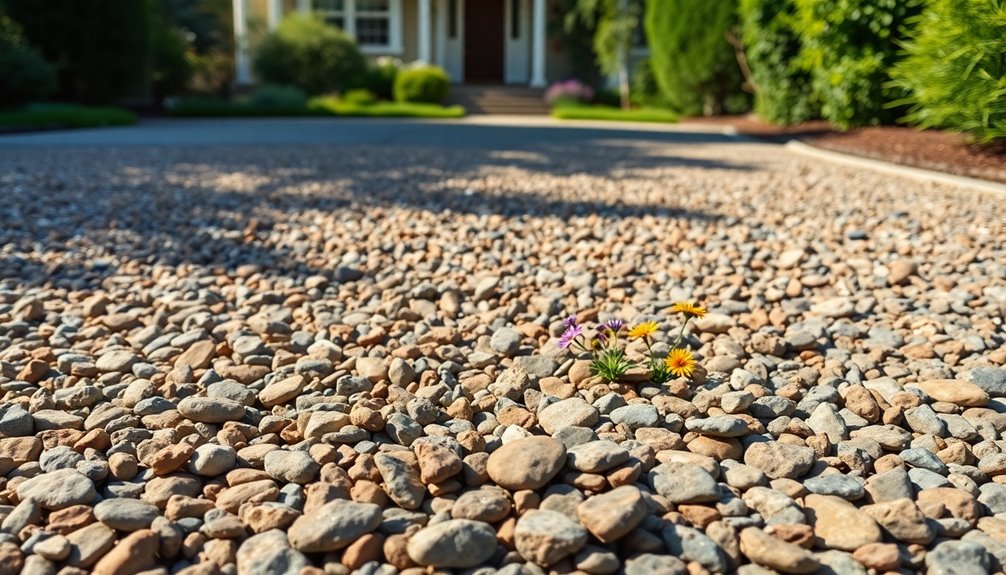
Gravel driveways offer a unique blend of affordability and practicality, making them a popular choice for many homeowners. One major pro is the low initial installation cost and minimal maintenance required. Their excellent drainage properties help prevent water accumulation and erosion, which is especially beneficial in cold climates.
However, gravel isn't without its downsides. It can erode over time and may require frequent replenishment, particularly in high-traffic areas. The surface can be uneven and noisy when driven on, which might disturb neighbors.
Additionally, gravel driveways can be less stable in wet conditions and may not be accessible for those with mobility issues. Weigh these pros and cons carefully to determine if gravel suits your needs.
Features of Brick Pavers
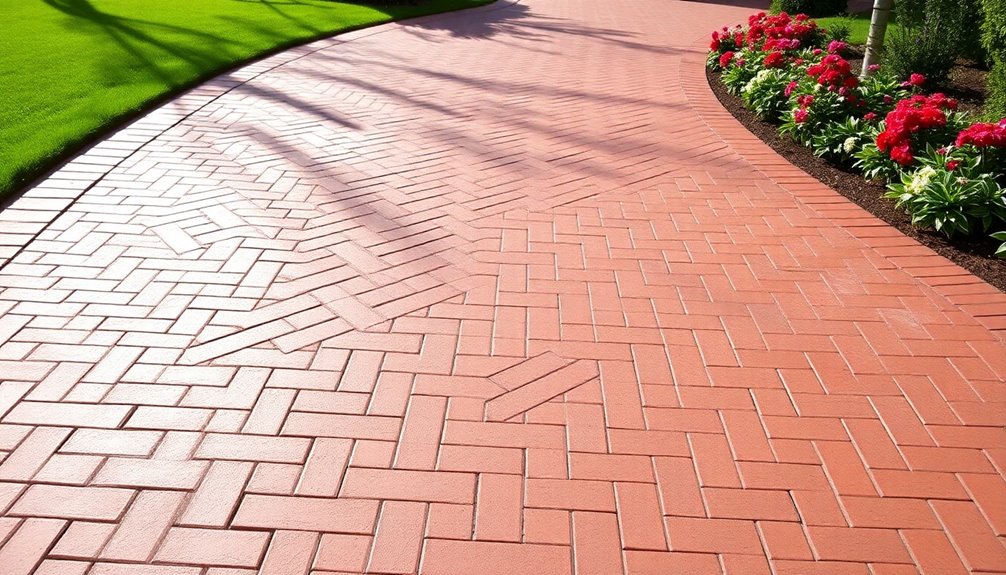
When considering a driveway option that combines durability and aesthetic appeal, brick pavers stand out as an excellent choice.
These pavers are long-lasting and can endure heavy foot and vehicle traffic, making them ideal for driveways. They resist weather variations, from heavy rainfall to extreme temperatures, and require minimal maintenance.
With a classic look and a variety of colors and textures, brick pavers enhance curb appeal and can boost your property value. Their flexible design allows for creative layouts, and installation is straightforward, whether you hire a pro or go the DIY route.
Plus, cleaning is easy, often needing just a broom or hose, ensuring your driveway remains beautiful for years to come.
Insights on Interlocking Pavers

Interlocking pavers are a fantastic choice for driveways, offering a perfect blend of durability and style. Available in materials like concrete and clay, these pavers can last decades—up to 50 years for concrete and 100 years for clay.
They withstand heavy traffic and various weather conditions, ensuring longevity with proper maintenance, like regular cleaning and sealing.
The aesthetic appeal is undeniable; you can choose from numerous designs, colors, and textures to suit your home's style. Plus, their easy installation and repairability make them a practical option.
With the added benefit of eco-friendliness, interlocking pavers not only enhance your driveway's look but also contribute to sustainability. Moreover, using sustainable materials like interlocking pavers can help support sustainable forestry practices, promoting a greener environment.
You'll love the combination of functionality and visual charm they provide!
Understanding Porous Pavers
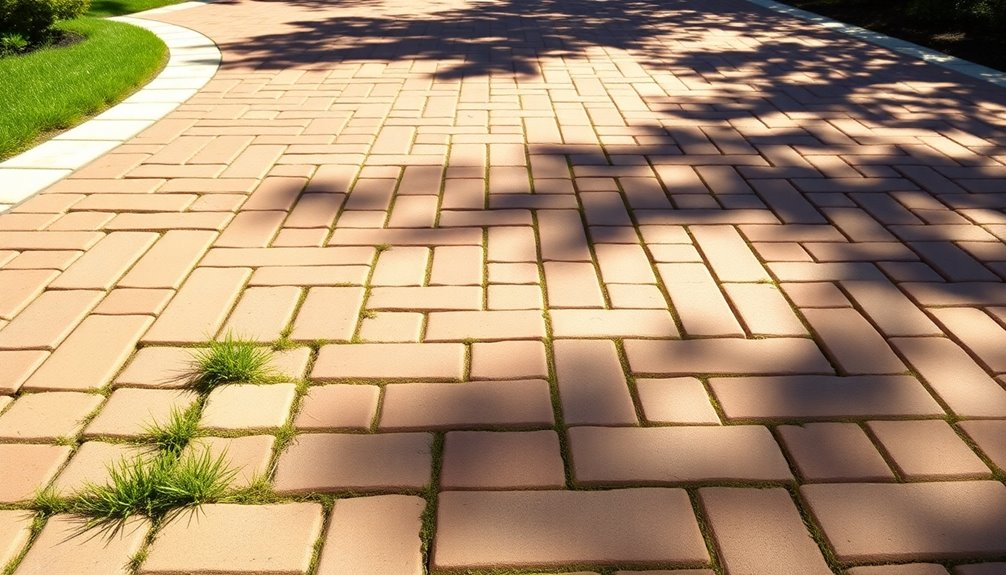
Porous pavers offer an innovative solution for driveways, combining functionality with environmental benefits. These pavers allow rainwater to seep into the ground, reducing stormwater runoff and erosion. Improved drainage means fewer puddles and flooding, enhancing safety for you and your vehicles.
Plus, they require less maintenance compared to solid options, saving you time and effort.
You can choose from various types, like permeable concrete, porcelain, natural stone, rubber, or porous asphalt pavers. Installation involves a stable base layer, sand bedding, and edge restraints to prevent shifting.
Regular maintenance—like cleaning, sealing, and inspections—ensures longevity. With their eco-friendly features, porous pavers not only boost curb appeal but can also increase your property value.
Frequently Asked Questions
How Can I Extend the Lifespan of My Driveway?
To extend the lifespan of your driveway, start with regular cleaning to prevent surface damage and enhance its appearance.
Promptly repair any cracks or holes to stop water seepage and further deterioration.
Consider sealcoating every few years for added protection against the elements.
Also, maintain proper drainage to prevent water accumulation, which can lead to potholes.
Finally, schedule professional inspections to catch hidden issues early and ensure everything's in good shape.
What Are the Best Colors for Enhancing Curb Appeal?
When you're looking to enhance your curb appeal, consider using neutral colors like gray or beige for a classic look.
Earthy tones, such as brown or terracotta, can create warmth and blend well with nature.
If you want to make a statement, opt for bold colors like red or blue.
Metallic finishes, like silver or bronze, can also add a modern touch.
Choose a color that complements your home's style and surroundings for maximum impact.
Which Driveway Material Is Best for Heavy Vehicle Traffic?
When considering the best driveway material for heavy vehicle traffic, you've got a few strong contenders.
Asphalt's durability and cost-effectiveness make it a popular choice, while concrete offers exceptional strength and longevity.
If aesthetics matter, pavers or brick can withstand heavy loads and enhance curb appeal, though they require skilled installation.
Ultimately, think about your budget, maintenance preferences, and desired look to find the best fit for your needs.
How Does Weather Affect Different Driveway Materials?
Weather significantly impacts driveway materials in various ways.
For instance, extreme temperatures can cause asphalt to crack and concrete to cure unevenly. Rain can erode asphalt and concrete, while gravel remains relatively stable.
Sunlight fades asphalt and pavers, affecting their appearance. Wind can blow debris onto surfaces, and ice creates slippery conditions for all materials.
Understanding these factors helps you maintain your driveway and ensure it stands up to the elements effectively.
What Are the Installation Timeframes for Each Driveway Type?
Imagine building your dream road, each stone laid with care.
When it comes to installation timeframes, asphalt typically takes 4-7 days, while concrete needs 6-10 days.
Gravel's quicker, requiring just 4-6 days, and brick or paver driveways fall between 6-9 days.
Planning ahead is key; knowing these timeframes helps you schedule your project effectively, ensuring you're ready for that first drive down your new pathway.
Conclusion
Choosing the best material for your driveway can transform your home's curb appeal and longevity. You might be leaning towards asphalt for its affordability, or maybe concrete for its durability. But wait—what if you could have the charm of brick pavers or the eco-friendliness of porous options? Each choice has its perks, but the right one could elevate your property to the next level. So, which one will you choose? Your driveway's destiny awaits!
